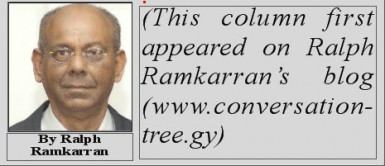It takes a certain mindset for a person to believe that he or she has the right to determine what information, otherwise lawful, that the citizens of Guyana should receive. Inculcated among some media practitioners and political operatives during the 1970s and 1980s, and pursued with vigour and venom between 2001 and 2015, this mindset is clearly alive and well in Guyana. State-owned media has long been seen as a party asset to be utilized for the benefit of the Government and Party in office.
 Given the opportunity to reject censorship, the Guyana Chronicle did the opposite. In justifying its failure to publish its own columnist, Dr. David Hinds, because it did not agree with the views he expressed on two occasions, it embarked on a paean to censorship in its editorial of April 20 entitled “The state newspaper.” It reiterated an earlier statement that “this newspaper is an arm of the state and will give primacy to the government’s agenda.” How is this different to the policy of the Chronicle during the eras mentioned above? The Chronicle is not an arm of the State. The State is merely a trustee of its owners who are the people of Guyana. I am a part owner of the Chronicle.
Given the opportunity to reject censorship, the Guyana Chronicle did the opposite. In justifying its failure to publish its own columnist, Dr. David Hinds, because it did not agree with the views he expressed on two occasions, it embarked on a paean to censorship in its editorial of April 20 entitled “The state newspaper.” It reiterated an earlier statement that “this newspaper is an arm of the state and will give primacy to the government’s agenda.” How is this different to the policy of the Chronicle during the eras mentioned above? The Chronicle is not an arm of the State. The State is merely a trustee of its owners who are the people of Guyana. I am a part owner of the Chronicle.
The editorial said that “editorial judgment needs to be exercised based on the need to enforce the newspaper’s policies and propriety in the society.” Supporting censorship, it said that “non-censorship is not unbridled” and in our fractured society the state media has “a duty of welding the people together.” The editorial said that the editors have challenges in balancing the “competing interests of those who desire their views and recount of history (to) be the dominant interpretation of reality.” A state employed journalist in 1979 or 2006 could not have put this mouthful better. Censorship in a “fractured society” if the “reality” of its masters is challenged, as justified by the Chronicle, perpetuates the fracture, rather than heals it.
With the expression of these editorial views no one should doubt that just as the Chronicle made some effort to improve for a brief period beginning in 1992, but then degenerated in the 2000s to a level equivalent to what it was in the 1970s and 1980s, or worse, that the efforts it has recently made will soon degenerate once again, unless something is done to root out the mindset that believes that censorship is permissible and justified.
The Government must appoint those who will carry out a mandate that reflects the Government’s role as the trustee. The Government, much less the editor, has no right to set a policy for the Chronicle that does not uphold journalistic principles, but instead emphasizes partisan political considerations. The policies of the State-owned media should be self-evident, namely, embracing critical examination of and support for or criticism of Government policies, the uncensored publication of the views of independent columnists, supportive of the Government or not, Opposition’s views and those supportive of the Opposition. No doubt editorial judgment will be exercised in relation to material which is defamatory, objectionable or offensive or which, for other legitimate journalistic reasons, cannot be published.
But it is the height of arrogance to arrogate to itself the “duty of welding people together” or being an arbiter on views of the past. The Chronicle’s duty is to bring the news, advocate its own views editorially and provide a forum for the people of Guyana to express their views provided those views are not defamatory, advocate illegality or are otherwise offensive. The policy adopted by the Chronicle led it to the censoring of David Hinds. How far down the slippery slope will it lead? I say right to the bottom. Once the sliding starts, it would not stop.
There are people at the Chronicle who are responsible for determining policy who do not subscribe to censorship and would support an independent, respected, State-owned newspaper. It is hoped that they will take the cue from President Granger who was very forthright in an interview published in the Chronicle last Friday. He said that “criticism is good” and that he has “privately and publicly maintained the importance of a free press.” The President called on the media to truthfully and critically examine the work of the administration so that they can help the government to improve its performance. True, President Granger did not deal specifically with the issues in contention, namely, the controversy over the censoring of David Hinds who criticized the President’s position on the Rodney COI’s report. He also did not address the Chronicle’s policy as announced in its editorial, or what its position should be in relation to Guyana’s controversial past, in particular past history in the era of PNC rule. But the broad outline of the President’s views suggests that he would be intolerant of censoring debate at all, including on Guyana’s past.
Having regard to the Chronicle’s confusion about its role, about journalistic principles and the statement issued by the Press Association yesterday, the time has come for the Government to establish a truly independent commission of respected citizens with the relevant experience to advise on the editorial policies of the State-owned media.





